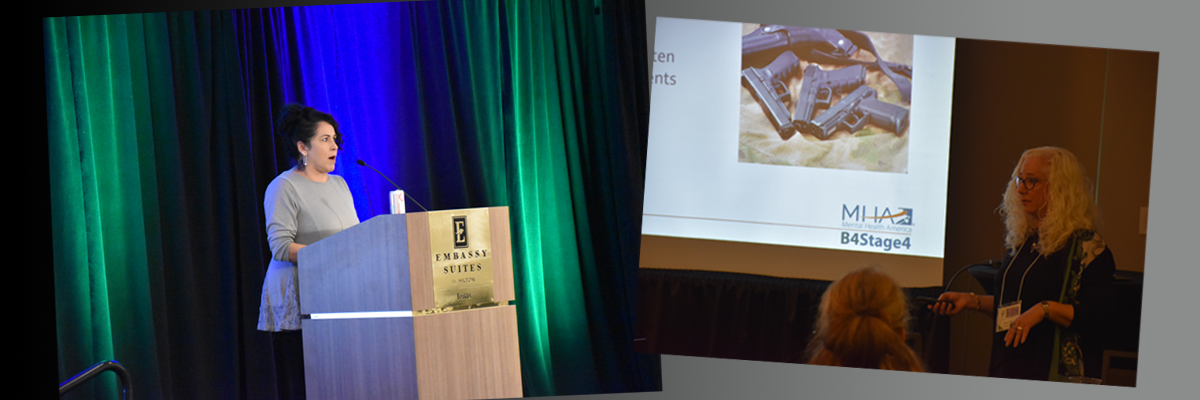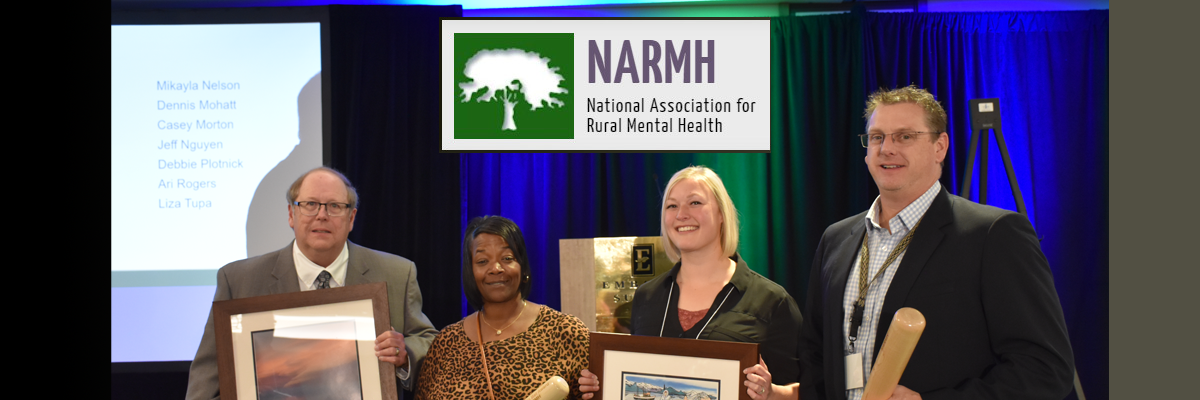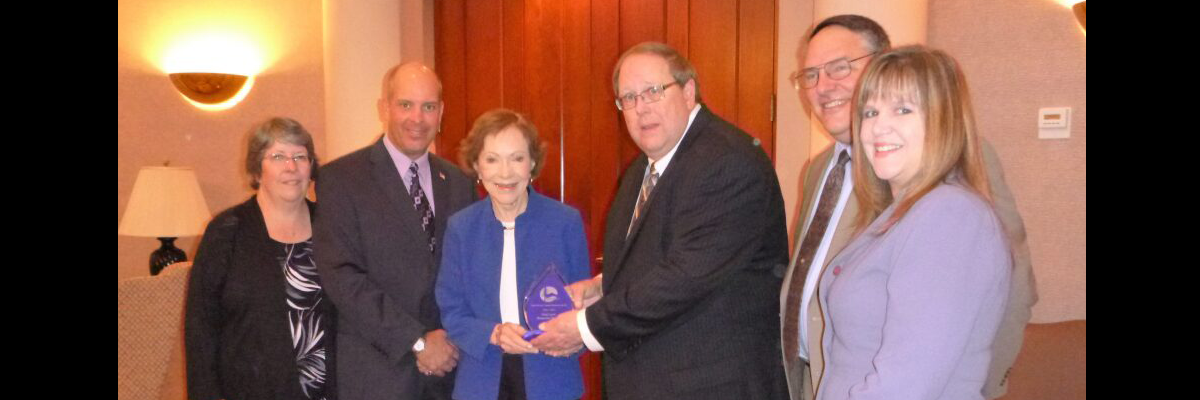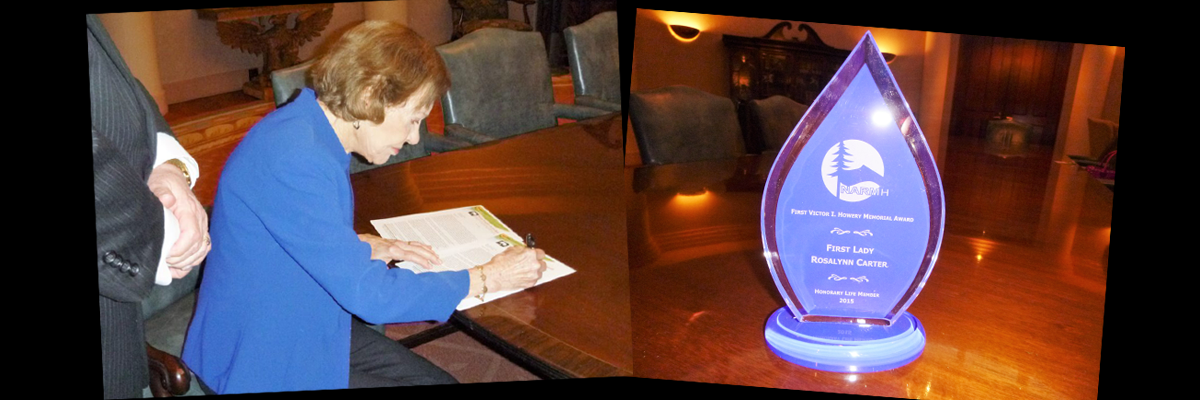
47TH ANNUAL NATIONAL ASSOCIATION FOR RURAL MENTAL HEALTH CONFERENCE
Embassy Suites – Boulder, Colorado – November 2 – 4, 2022
Beyond the Pandemic – Building on Rural Resiliency
Speakers
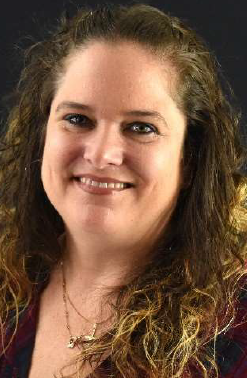
Erin Briley, MS, NCSP
Erin Briley works for WICHE’s Behavioral Health Program as a Research and Technical Assistant Associate as well as a Technical Trainer for the Mountain Plains MHTTC. Ms. Briley’s work with the WICHE Behavioral Health Program includes a variety of behavioral health projects, but her primary roles involve assisting the creation and implementation of Psychology Internship Consortiums in rural western states as well as providing training and supports for school behavioral health. Prior to coming to WICHE, Ms. Briley worked for 20 years in the schools, serving primarily as a school psychologist and providing educational and behavioral health direct and indirect supports for children ages 3 through 22 of all developmental levels in California, Hawaii, and Colorado. During that timeframe, Erin also had opportunities to serve as a special education administrator, program manager for a School Based Behavioral Health program for Hawaii’s Department of Education, as well as trained and supervised paraprofessionals providing individualized supports to children with special needs. She earned her Bachelor’s in Human Development and Family Studies at Colorado State University, her Master’s in Counseling/School Psychology and a Certificate in Applied Behavior Analysis at California State University Los Angeles and is working on her PhD (ABD) in Clinical Psychology. Ms. Briley is a Nationally Certified School Psychologist. She has completed certificates in Grant Writing and is working towards her Credential in Public Leadership.

Marc S. Condojani, LCSW, CAS
Marc Condojani is a licensed clinical social worker and a certified addictions specialist in Colorado. He has been working in the behavioral health field for 29 years, during which time he has held a variety of positions including clinician, manager, educator and administrator. Marc is the Director of Adult Treatment and Recovery for the Division of Community Behavioral Health, Office of Behavioral Health within the Colorado Department of Human Services. His team contracts for behavioral health services in Colorado, with oversight responsibilities for the treatment and recovery services funded by the SAMHSA behavioral health block grants, numerous discretionary grants, and State general and cash funds. He has served on a number of Colorado interagency committees, including as Vice Chair for Treatment of the Substance Abuse Trend and Response Task Force that is chaired by the State Attorney General. He represented Colorado on the National Association of State Alcohol and Drug Abuse Directors (NASADAD) as the Vice President of the National Treatment Network. He is the Project Director for three SAMHSA grants awarded to Colorado focused on the opiate crisis.
Sarah Davidon, Ed.D.
Davidon Consulting
Since 1998 Dr. Sarah Davidon has lived and worked in Colorado, while also consulting nationally, providing technical assistance, delivering keynote addresses and presentations, and authoring publications, all designed to help organizations identify and commit to effective children’s mental health policy and program investment. She is the founder and principal consultant with Davidon Consulting, where she serves as a nationally recognized expert in both early childhood and school-age mental health system design and strategy, working with organizations in Colorado and across the country to improve how children’s mental health is understood and addressed. Dr. Davidon developed pioneering School Mental Health and Early Childhood Mental Health Toolkits, identifying best practices and strategies to promote children’s mental health. She served as a Governor’s appointee to the Children’s Mental Health Subcommittee of the Colorado Behavioral Health Task Force, serves on the Board of Directors of Healthy Child Care Colorado, has held appointments to the Douglas County Commissioners’ Mental Health Committee, Jefferson County School Safety and Security Task Force, and Colorado’s Behavioral Health Transformation Council, and is past-president of the Colorado Federation of Families for Children’s Mental Health. Dr. Davidon is a graduate of Bryn Mawr College and the Harvard University Graduate School of Education and received her doctorate from the University of Colorado School of Education and Human Development in educational equity, and holds assistant professor appointments at both the University of Colorado School of Medicine and Georgetown University.
Amey Dettmer, CPS
Amey Dettmer is a person with lifelong lived experience with mental health challenges. In 2011 she graduated from a Peer Specialist Certification Training, and began offering Medicaid billable and community-based peer support services in Pennsylvania. By 2014, she was introduced to the role of a peer support supervisor, and by 2016 started working with the Copeland Center for Wellness and Recovery. At the Copeland Center she works as the Program Manager of the SAMHSA-funded National Consumer Technical Assistance Center; Doors to Wellbeing. In this role, she supports the organizing of various statewide and national peer workgroups and committees, develops peer support and recovery training curriculums, conducts research, and provides technical assistance and peer support education to peer communities and organizations throughout the United States. Amey’s work focuses specifically on peer specialists, youth leadership development, and peer-led recovery education. In December 2018, her devoted efforts resulted in recognition by the National Association of Peer Supporters (N.A.P.S.) as she received the “Disruptive Innovator Award” highlighting her work in youth peer leadership and honoring her as a young adult who has made a significant transformative contribution to the field of Peer Support through leadership, programming, and activism. In September 2019, Amey became a N.A.P.S. Board Member and is currently working alongside international peer support leaders to strengthen the peer workforce globally. Amey is a nationally recognized Advanced Level WRAP Facilitator and holds her Certified Peer Specialist Certification through the Pennsylvania Certification Board although she currently resides in rural cental Vermont.
John Draper, PhD
Executive Vice President, National Networks, Vibrant Emotional Health
Dr. John Draper has over 30 years of experience in crisis intervention and suicide prevention work, and is considered an international expert in crisis contact center practices (hotline, online chat, text services, etc.). Since 2004, Dr. Draper has been the Executive Director of the SAMHSA-funded National Suicide Prevention Lifeline (800-273-TALK, now also the 988 service), overseeing all aspects of this service—including its subnetwork, the Disaster Distress Helpline—and the Lifeline’s partnership with the VA in administering the Veteran’s Crisis Line. As an expert in crisis services, Dr. Draper has regularly engaged with print, broadcast and web-based media for over 20 years. Dr. Draper has been quoted in The New York Times, ABC News, The New York Post, and TIME among others.
Jordan Gulley, Senior Associate
TAC
Jordan Gulley, LICSW, has ten years of experience managing and administering programs providing direct services to people with behavioral health conditions and those experiencing homelessness. Prior to joining TAC, she was the Site Coordinator/Clinical Director of the DC Department of Behavioral Health’s Community Response Team (CRT) a 24-hour crisis response and behavioral health outreach team; a program she supported with the design, creation, implementation and data mapping. Her work has concentrated on enhancing cross-system efforts to improve crisis response services through collaboration with law enforcement, first responders, and the 911-dispatch system (PSAPS). Her efforts enhanced co-response services for individuals with behavioral health issues, diverted individuals with low-level offenses from the justice system into intensive behavioral health services, and assisted in the creation of a pilot 9-1-1 call diversion program. She served on the key stakeholder task force to evaluate the District’s commitment and implementation laws and recommend modifications to promote autonomy and promote trauma-informed care. Mrs. Gulley served as a co-chair of the Washington, D.C. Interagency Council on Homelessness, provided police officers with Crisis Intervention Training on behavioral health services and crisis response, and she currently teaches fourth-year psychiatric residents how to enhance comprehensive psychiatric care for individuals experiencing homelessness. At TAC, she works on PEW-funded initiative supporting states in planning for the implementation of the new national 988 mental health crisis hotline and a California Health Care Foundation project to assist states in utilizing American Rescue Plan Medicaid expansion funding strategies to create a more robust, streamlined, and comprehensive crisis response system.

Ciara Hansen, Ph.D.
Northern Navajo Medical Center
Shiprock, NM
Dr. Ciara Hansen is a clinical psychologist in the Iina’ Counseling Services department at Northern Navajo Medical Center located at the Indian Health Service Hospital in Shiprock, NM. Dr. Hansen earned her Ph.D. from the University of Montana as a member of the Indians into Psychology (INPSYCH) program. She completed her pre-doctoral internship and her post-doc fellowship at Waianae Coast Comprehensive Health Center, located on the leeward coast of Oahu, serving primarily a Native Hawaiian population. Dr. Hansen’s clinical work has focused on using evidence-based treatments to meet the psychological needs of underserved minority communities. She uses a cognitive-behavioral theoretical orientation situated within a multicultural/intersectional framework to conceptualize client symptomology and often uses third-wave therapies to address client concerns. Dr. Hansen’s research has aligned with her clinical goals to address health disparities and build capacity within American Indian communities.

Rebecca Helfand, Ph.D.
Rebecca Helfand received her PhD in Psychology with a doctoral minor in statistics from Baylor University before moving to Colorado as a Postdoctoral Fellow at the University of Colorado’s Institute for Behavioral Genetics. Prior to joining the American Psychological Association as the Senior Director for Scientific Knowledge and Expertise, she worked for the WICHE Behavioral Health Program team where she conducted a variety of research projects and oversaw teams of evidence-based practice fidelity reviewers in several states. Before that Rebecca worked for the Office of Behavioral Health in the State of Colorado Department of Human Services. In her four years with OBH, she worked on a variety of projects with other state agencies, namely the Colorado Department of Public Health and Environment and the Department of Healthcare Policy, and Financing. Rebecca served as the Director of the Data and Evaluation unit within OBH where she supervised a team of twelve people, affording her the opportunity to work on projects throughout the OBH office.
David Hughes, PhD.
President
Human Services Research Institute
David Hughes is the president of HSRI and works in the field of behavioral health services research—with a particular focus on evidence-based practices, outcome and quality measurement, the intersection of the behavioral health and criminal justice systems, and cost simulation models. David has authored several publications on criminal justice diversion strategies and has led behavioral health system redesign efforts in several states and counties including Milwaukee County, North Dakota, South Dakota, New Hampshire, Pierce County (Washington), and Multnomah County (Oregon).
René Keet
René Keet is practicing psychiatrist and director at the community mental health service GGZ-Noord-Holland-Noord, The Netherlands. He leads the FIT Academy (Flexible, Innovative Top-ambulatory https://bit.ly/2xfeRBv, that provides training, e-learning, service evaluation and support to international reform projects of community mental health care.
He is chair of the European Community Mental Health Services network (EUCOMS, https://www.eucoms.net. The aim of this network is to learn from each other in international exchange and support human rights in mental health care. It is a community of practice, based upon a shared vision on community mental health. This vision is described in the consensus document that you can download from the website: https://bit.ly/2V6dGxl. He describes the 6 principles in 15 minutes in https://vimeo.com/256413380.
He is an international expert in mental health reform projects MENSANA in Moldova (http://trimbos.md/?lang=en) and other projects, mainly in Central and Eastern Europe. Currently he is involved in a training of workforce in community mental health centres in Turkey, a project co-financed by the European Union and the WHO. He is a member of the Council Clinical Leaders of the International Initiative Mental Health Leadership (IIMHL) https://www.iimhl.com/.
Nancy Kirchner
Nancy Kirchner currently works for the Centers for Medicare & Medicaid Services (CMS) in the Division of Benefits and Coverage, working on Medicaid state plan benefits, a position she has held since March of 2012. Prior to that position she worked in CMS for four years as a health insurance specialist focusing on home and community based services, including 1915 (c) waivers, optional Medicaid state plan services, the Money Follows the Person program and employment policy. Prior to her position at CMS, Ms. Kirchner worked at several executive level positions at the Maryland Developmental Disabilities Administration over a period of eleven years. She worked in several non profit agencies providing supports and services to people with developmental disabilities for fourteen years prior to that time. Ms. Kirchner has a Bachelor of Arts Degree from Franklin and Marshall College and a Masters Degree in Social Work from the University of Maryland School of Social Work and Community Planning.
Kathy Langlois
Kathy Langlois, MPA, works toward providing opportunities for leadership development and rapid knowledge exchange in mental health, addictions and disability through her work as the North America Regional Lead for the International Initiative for Mental Health Leadership (IIMHL) and the International Initiative for Disability Leadership (IIDL). Kathy is passionate about improving mental health, addictions and suicide prevention outcomes, including working in partnership with Indigenous peoples. Kathy has a background of 35 years in public service at the federal and provincial government levels in Canada. Since 2014, she has been consulting on mental health and addictions leadership and policy, including internationally. Kathy supports IIMHL’s Rural Behavioral Health Collaborative, which convenes leaders who work in or are interested in rural mental health, as part of a global initiative to rapidly share knowledge and promising practices.
Penny Logue
Tenacious Unicorn Ranch
Owned by Penny Logue and Bonnie Nelson, the Tenacious Unicorn Ranch acts as a trans and queer haven in rural Westcliffe, Colorado. Founded in 2018, the Tenacious Unicorn Ranch continues the mission of creating a safe place for LGBTQIA+ individuals to escape the cis/het world, surrounded by hundreds of cute fluffy animal, gorgeous views of majestic mountains and rolling hills.
Kevin Martone, NARMH President
Executive Director, Technical Assistance Collaborative (TAC)
Kevin Martone is Executive Director of the Technical Assistance Collaborative (TAC) and President of the National Association for Rural Mental Health (NARMH). Kevin has provided consultation to numerous federal, state and local agencies on a range of issues related to behavioral health systems, including Olmstead and community integration, crisis services, Medicaid financing, homelessness, and supportive housing. Prior to TAC, Kevin spent six years at the New Jersey Department of Human Services (DHS) as the state mental health commissioner. During this time, he was on the NASMHPD Board for four years, including a year as Board President. Earlier in his career, he was CEO of a supportive housing agency and spent several years working in community mental health. He has taught courses at the Rutgers University School of Social Work and Tufts University School of Medicine. Kevin is currently president-
elect for the National Association for Rural Mental Health.
Ted Matthews
Minnesota Rural Mental Health Support
Ted Matthews is a mental health practitioner with over 30 years of experience in counseling in rural areas. His focus for the past 2 decades has been farmer mental health support. He has been the director of mental health services during five natural disasters. Matthews provides outreach training and public speaking related to farm stressors, nationwide. He also has extensive counseling experience in the areas of PTSD, crisis intervention, family issues, suicidology and domestic abuse. Featured on the Huffington Post, MPRNews, CNN, AgriNews, Successful Farming, Prairie Farmer and many others, Ted offers his expertise to help the generation population to better understand the farming culture.
Monica McConkey
Monica McConkey has 25 years of experience in the behavioral health field as a counselor, program supervisor and administrator. She has a Masters Degree in Counseling and is a Licensed Professional Counselor in the state of Minnesota. Her focus throughout her career has been to increase access to, and remove the stigma often attached to mental health services in rural areas. She currently works as one of two Rural Mental Health Specialists in Minnesota providing support to farmers and their families through a contract with the MN Ag Centers of Excellence and Farm Business Management. Monica also provides education and training on mental health and resilience through her business Eyes on the Horizon Consulting, LLC.
Richard McKeon Ph.D., MPH
Chief, Suicide Prevention Branch, SAMHSA
Richard McKeon Ph.D., MPH received his Ph.D. in Clinical Psychology from the University of Arizona, and a Master’s of Public Health in Health Administration from Columbia University. He has spent most of his career working in community mental health, including 11 years as director of a psychiatric emergency service and 4 years as Associate Administrator/Clinical Director of a hospital based community mental health center in Newton, New Jersey. In 2001, he was awarded an American Psychological Association Congressional Fellowship and worked in the United States Senate for Sen. Paul Wellstone, covering health and mental health policy issues. He spent 5 years on the Board of the American Association of Suicidology as Clinical Division Director and has also served on the Board of the Division of Clinical Psychology of the American Psychological Association. He is currently Chief for the Suicide Prevention Branch in the Center for Mental Health Services, of the Substance Abuse and Mental Health Services Administration, where he oversees all branch suicide prevention activities, including the Garrett Lee Smith State/Tribal Youth Suicide Prevention, and Campus Suicide Prevention grant programs, the National Suicide Prevention Lifeline, the Suicide Prevention Resource Center, and the Native Connections program. In 2008, he was appointed by the Secretary of Veterans Affairs to the Secretary’s Blue Ribbon Work Group on Suicide Prevention. In 2009, he was appointed by the Secretary of Defense to the Department of Defense Task Force on Suicide Prevention in the Military. He served on the National Action Alliance for Suicide Prevention Task Force that revised the National Strategy for Suicide Prevention and participated in the development of WHO’s World Suicide Prevention Report. He is also the Co-Chair of the Federal Working Group on Suicide Prevention.
.
Megan Meacham, MPH
HRSA
Director, Rural Strategic Initiatives Division
Federal Office of Rural Health Policy
Megan Meacham is Director of the Rural Strategic Initiatives Division (RSID) within the Federal Office of Rural Health Policy (FORHP), where she leads the team that manages a number of high-priority rural health grant programs, including the Rural Communities Opioid Response Program. Prior to becoming Director of RSID, she served as a Senior Advisor in FORHP where she worked on a variety of rural program and policy issue areas, and was a key member involved in the creation of the RCORP Initiative. She has also worked as a Project Officer in FORHP’s Hospital State Division where she coordinated a national quality improvement initiative and managed a number of state-based grant programs. Megan attended Vanderbilt University for her undergraduate degree in Sociology and then returned back to her home state of Minnesota to attend the University of Minnesota School of Public Health where she got her MPH. She worked at the Minneapolis VA Medical Center as a Pandemic Influenza Planner prior to joining HRSA.
Steve Miccio
Chief Executive Officer
People USA
Steve Miccio is Chief Executive Officer of People USA. Inspired and driven by his personal lived experience, Steve has spent over two decades creating, providing, and promoting innovative crisis response services and systems-level improvements – across the United States and internationally – that raise the bar on customer service, person-centered communication, trauma-informed care, empathy, and positive expectations for people’s recovery & wellness outcomes. Steve’s unique models and approaches significantly reduce hospital utilization, incarceration rates, and overall healthcare spending.
Steve’s professional highlights since joining People USA in 1999 include the following:
- First in the United States to embed peers in a hospital psych. ER, blazing the way for a best and evidence-based practice standard today.
- Created the Rose House model of peer-operated crisis respites / home-like alternatives to hospital psych. ERs & inpatient units; first peer-run hospital diversion houses in New York.
- Helped open 39 peer-operated crisis respites using the Rose House model across the United States and Europe.
- Created the Westchester Forensic Mobile Crisis & Response Team; first peer-run criminal justice-focused mobile team in the United States.
- Developed unique training programs – for hospitals, local government units, and behavioral health organizations across the U.S. – to help them build tomorrow’s behavioral health workforce and culture.
- Organized and provided Crisis Intervention Team (CIT) trainings to hundreds of law enforcement throughout New York state
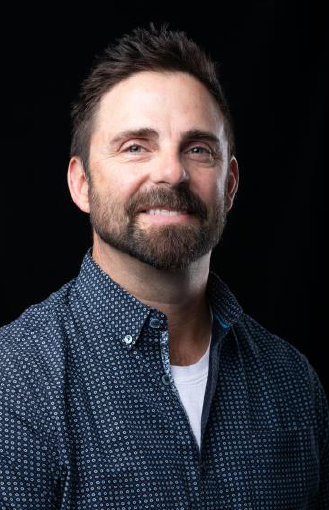
Kurt Michael
Aeschleman Distinguished Professor, Appalachian State University
Dr. Kurt Michael is the Stanley R. Aeschleman Distinguished Professor of Psychology at Appalachian State University (ASU). He was trained at the University of Colorado – Boulder (B.A., cum laude), Utah State University (M.S., Ph.D.), and Duke University Medical Center (Clinical Psychology Internship). His primary areas of research and clinical practice are suicide prevention, school mental health, and rural healthcare. Dr. Michael currently serves as an Associate Editor of the Journal of Rural Mental Health and is the Editor (JP Jameson, Co-Editor) of the first edition of The Handbook of Rural School Mental Health (Springer).
In addition to Dr. Michael’s teaching and research interests, he is a practicing Licensed Psychologist and in 2006, developed and implemented interdisciplinary school mental health partnerships titled the Assessment, Support, and Counseling (ASC) Centers in rural western North Carolina. The ASC Center was designed to serve children and families in North Carolina while at the same time, provide pre-professional and professional workforce development, which aligns well with ASU’s strategic mission to improve the health of North Carolinians and to have a sustained impact on the region, both economically and culturally.
Dr. Michael is a subject matter expert for the JED Foundation and consults with agencies on a national level regarding the development of suicide prevention protocols for K-12 schools. Dr. Michael is also a national consultant for the Collaborative Assessment and Management of Suicidality (CAMS) Program.
Nastacia’ Moore, Senior Associate
TAC
Nastacia’ Moore has more than ten years of experience working in areas of human services, housing, and homelessness. Her work has focused on developing systems-level responses to historical racial inequality across the country. Recently, she has led technical assistance work for the Department of Urban Development (HUD), centered on advancing racial equity at the intersection of COVID 19, housing, and homelessness. In addition, Ms. Moore has leveraged her expertise by working with regions across the country to strengthen the Continuum of Care (CoC) system’s capacity to disrupt systemic and institutional policies that perpetuate disparate outcomes for Black, Indigenous, People of Color (BIPOC) experiencing homelessness.
Kristin Neylon, M.A.
Senior Project Associate, NASMHPD Research Institute
Ms. Neylon has 15 years of experience conducting qualitative and quantitative research related to mental health and public policy. During this time, she has focused her attention on initiatives that bring subject matter experts and behavioral health stakeholders together to identify needs and discuss strategies to improve interagency collaboration, service delivery, service integration, and ultimately the lives of clients receiving services in the public behavioral health system. Ms. Neylon collects and analyzes quantitative and qualitative data about public mental health systems (including crisis services), researches, writes, and edits reports and literature reviews for federal and state government agencies and other stakeholders. She is particularly interested in the challenges associated with service delivery to underserved populations, including those in rural and remote areas of the U.S. Ms. Neylon recently authored reports on The Delivery of Behavioral Health Crisis Services in Rural and Frontier Areas of the U.S., and Using Technology to Improve the Delivery of Behavioral Health Crisis Services in the U.S. She also co-authored the report with colleagues from NASMHPD Improving Behavioral Health Services for Individuals with SMI in Rural and Remote Communities for SAMHSA’s SMI Adviser.
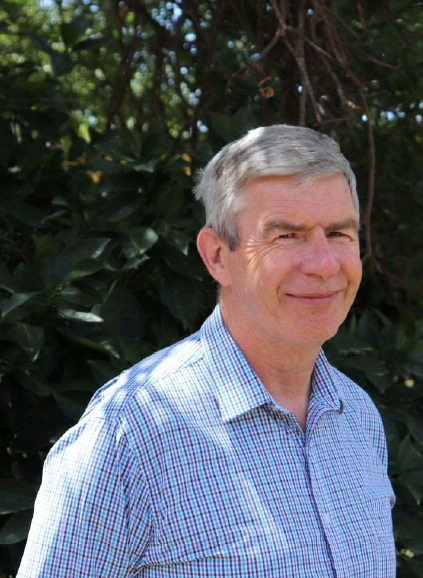
Professor David Perkins
Director
Centre for Rural and Remote Mental Health
Orange, NSW
Professor David Perkins is the Director and Professor of Rural Health Research at the University of Newcastle’s Centre for Rural and Remote Mental Health, based in Orange, New South Wales. He has extensive research experience in Mental Health Services, Rural Suicide Prevention, Public Health, Rural Health and Primary Health Care. David’s career spans senior management and health service research roles in both the United Kingdom and Australia. David has been awarded more than $22 million in grant income in the last five years. He has published in a variety of journals including Medical Journal of Australia, BMC Health Services Research, the International Journal of Integrated Care, Aging and Mental Health, BMC Psychiatry and the Australian Journal of Rural Health. He is the coordinator of the Orange Declaration on Rural Mental Health (https://doi.org/10.1111/ajr.12560) and was previously Editor in Chief of the Australian Journal of Rural Health.
Debbie Plotnick
Debbie F. Plotnick, MSS, MLSP is the Senior Vice President for State and Federal Advocacy at Mental Health America (MHA). Debbie is recognized as a national thought leader contributing expertise on a wide range of topics in behavioral health to local, state and federal policy makers, works with national legislator groups as topic expert,serves on task forces, provides background for investigative reporting, and is regularly interviewed by the media. In her role at Mental Health America, Debbie provides leadership for grassroots and legislative advocacy across the MHA affiliate network and to national legislator groups. She coordinates the efforts of the Regional Policy Council (RPC), which focuses on state-level initiatives for equal access to behavioral health care, a full continuum of treatment and services, criminal justice diversion and deflection, and the value of prevention and early intervention. Her most recent projects include working with the firearm owning community to promote mental health screening and training in suicide prevention for adolescents and adults. Debbie holds three degrees from Bryn Mawr College: an AB in political science; dual master’s degrees in Social Service (MSS) and Law and Social Policy (MLSP). Informing her perspective and her passion, are the people she works with and for, her own lived experience with depression, as a family member to those with mental health challenges, and her dedication to mental health systems advocacy.
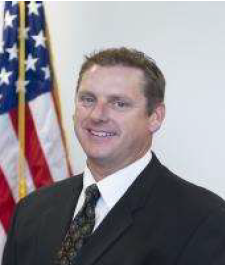
Charles H. Smith, PhD, MA
Regional Administrator Substance Abuse and Mental Health Services Administration U.S. Department of Health and Human Services – Region VIII
(Colorado, Montana, North Dakota, South Dakota, Utah, Wyoming, and 33 Tribal Nations)
Dr. Smith is the Regional Administrator for the Substance Abuse and Mental Health Services Administration (SAMHSA), U.S. Department of Health and Human Services – Region VIII. Dr. Smith is the former Director of the Colorado Division of Behavioral Health and Deputy Commissioner of Mental Health and Substance Abuse for the State of Colorado. He is a Licensed Psychologist with over 30 years of experience in fields of forensic psychology, addiction psychology, crisis intervention, integrated care and behavioral health policy and administration. Dr. Smith holds a PhD in Counseling Psychology from the University of Denver, a MA in Rehabilitation Counseling from New York University, and a BS in Psychology from Allegheny College.
Gerard Vaughan, M Soc Sci (Hons)
Since 2012 Gerard has worked independently helping organisations design social good programmes. A highlight has been creating Farmstrong, a wellbeing programme for farmers. Prior to this Gerard has worked in NZ, Australia and the UK in a range of not for profit and government agencies in the areas of community development, health promotion, communications and social marketing. Previous roles have included, five years as CEO of the Alcohol Advisory Council of NZ with a mission to reduce harms from alcohol, and five years leading NZ’s national mental health campaign Like Minds, including a year establishing the National Depression Initiative featuring John Kirwan – a well known NZ rugby player. Gerard was born in Wellington, comes from a large extended family and has a daughter and a son who keep him grounded as they navigate their way through early adulthood.
Paula Verrett
Paula Verrett has a particular interest in mental health. She has been involved with NAMI Fox Valley located in Appleton, Wisconsin since 1997, first as a participant of peer support programs and then as a peer support group facilitator as a volunteer. She became a Certified Peer Specialist in 2010. Paula was hired by NAMI Fox Valley in 2012 as the Recovery Specialist. Her work in peer support gave her the confidence to return to school to earn her MSW from UW-Oshkosh in 2014. Paula was promoted to Iris Place Peer Run Respite Program Director in 2017. She has found healing through her work as the director of the Iris Place Program.
Dow Weiman, PhD.
Senior Research Associate
Human Services Research Institute
Dow Weiman is a researcher and program evaluator whose work currently focuses on behavioral health systems planning, needs assessment, policy analysis and program implementation. Dow is particularly dedicated to the application of implementation science for addressing challenges and improving services in complex behavioral health systems. He especially values a collaborative approach in working with a broad range of stakeholders to promote effective, feasible and sustainable system change. Prior to joining HSRI, Dow held mental health services research positions at the Kennedy School of Government and the Cambridge Health Alliance, a Harvard teaching hospital, where he continues to hold an appointment as Lecturer in Psychiatry. He also has many years of experience as a clinician and program director in a variety of inpatient and outpatient settings, which has been valuable for an in-depth understanding of behavioral health systems and the populations they serve.
Sheamekah Williams
Sheamekah Williams is the Director of Children, Youth, and Family Services at the Oklahoma Department of Mental Health and Substance Abuse Services. She is responsible for the administrative oversight and coordination of behavioral health services for children, youth, young adults, and families across the state. As the administrator over behavioral health services, she works with all phases of programs, from development and strategic planning through implementation and outcomes monitoring to sustainability. Her leadership has enabled Oklahoma System of Care exponential growth with more than a 1000% increase in enrollment during her tenure. Sheamekah has overseen OKSOC expansion from a 17-county program serving children ages 5-18 to a sustained, statewide program serving ages 0-25 across all of Oklahoma’s 77 counties. She has also been the driving force behind strengthening the system of care by expanding the service array—most notably, by establishing mobile crisis response as a sustained statewide service—and building partnerships with the education, child welfare and juvenile justice systems.
Sheamekah is an adjunct professor at the University of Oklahoma School of Social Work and a consultant with the Technical Assistance Collaborative (TAC) located in Boston. In this role, she is working with the State of Alabama as part of the EPSDT lawsuit, providing consultation around the development of medically necessary, intensive home-based services for youth with Serious Emotional Disturbance, specifically, the implementation of Intensive Care Coordination and the implementation of practice within a Community Mental Health Setting. She has served as a consultant with SAMHSA’s National Technical Assistance Network where she worked with SAMHSA grantees in building new programming for children’s mental health, identifying challenges and barriers, and developing problem-solving strategies.


